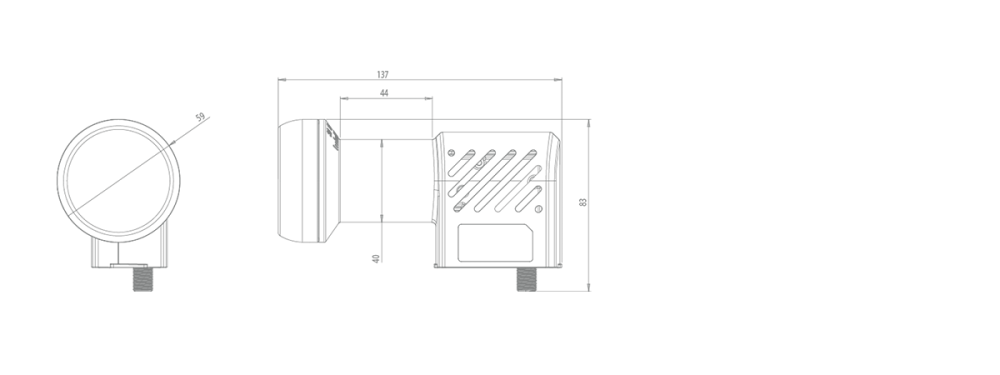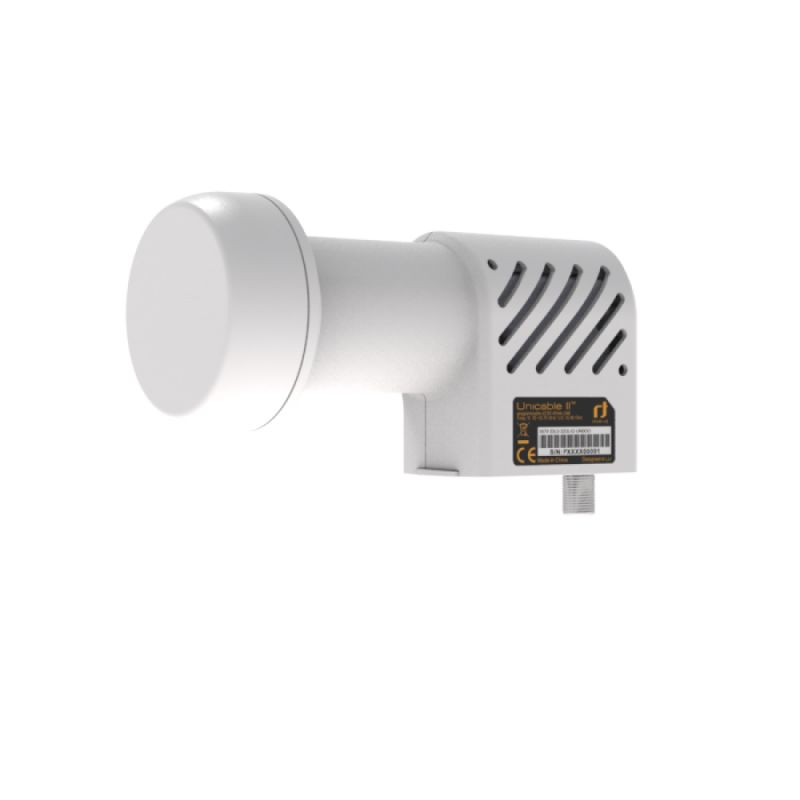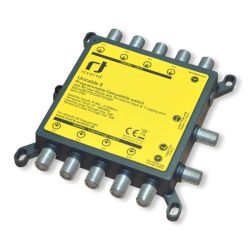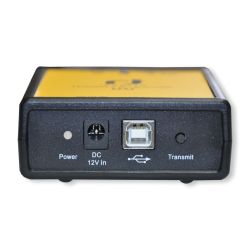This Unicable II™ LNB is based on digital channel stacking technology and allows to connect up to 32 satellite receivers over a single coax cable. The LNB support the standard EN50494/EN50607 protocols, allowing the connected receivers to access any transponder of the received satellite (also known as ‘Dynamic’ mode).
Alternatively, the LNB can be configured to down-convert a programable set of up to 32 transponders (depending on the bandwidth of the desired transponders) and stack them over its output (also known as ‘Static’ mode). This mode allows an unlimited number of receivers to be connected and access these transponders.
Digital channel stacking technology uses fast wideband analog to digital converters and applies digital signal processing to select desired transponder channels, up convert them and stack them as IF signals over the output port. Unicable II™ LNBs offer a cost effective and elegant solution for distributing the satellite signals to multiple set-top-boxes (multiroom) or multi-tuner PVRs over existing cabling hence significantly reducing cost and complexity of the installation at the subscribers’ homes. The Static mode, allowing an unlimited number of receivers to be connected to the LNB over a single cable distribution, makes installations in buildings, campuses and closed communities substantially cheaper and simpler than ever before. The operating mode (dynamic/static), output power level, channel bandwidth, UB frequencies and dish alignment mode are all programmable and can be configured and updated in the field using Inverto’s SatPal™ Controller*.
The LNB can be powered over a connected STB or by an AC/DC adapter over a power inserter in case the STB is unable to provide the necessary power. Unicable II™ is backward compatible, fully compliant with both EN50494 and EN50607 standards and integrates seamlessly into EN50494-only or mixed EN50494/EN50607 installations of compatible STBs, Next Generation PVRs and HGWs.
For more information on the Unicable II™ technology and its advantages please refer to: www.inverto.tv/what-is-unicable-2
For more information on the SatPal™ technology and its advantages please refer to: www.inverto.tv/satpal
Main Features
- Low Phase Noise UHD DVB-S2 compliant
- Low Noise Figure
- Very high cross-polarization isolation
- Programmable configuration
- Legacy emulation mode
- Low power consumption
* SatPal™ Controller not included, sold separately as an accessory.

Specifications
| Inverto | IDLU-32UL42-UNBOO-OPP |
|---|
| Input Frequency Range |
10.7 ~ 12.75 GHz |
| LO frequency |
10.4 GHz |
| Noise figure |
1 dB max. |
| LO temperature drift |
1 MHz max. |
| LO Initial accuracy @ 25 ºC |
500 kHz max. |
| LO Phase Noise @ 1 kHz |
-60 dBc/Hz max. |
| LO Phase Noise @ 10 kHz |
-80 dBc/Hz max. |
| Converson gain |
55 dB min. |
| Gain variation (over full band) |
±0.75 dB/UB max. |
| Image rejection |
40 dB Min. |
| 1 dB compression point (@ output) |
0 dBm min. |
| Cross polarization isolation |
23 dB min. |
| Output VSWR |
2.5 : 1 |
| Current consumption |
350 mA max. @ 13.5 V |
| Output impedance |
75 Ω |
| Output connector type |
F-Type (female) |
| Weight |
164 g |
| Banwidth User Band |
Configurable, 10 MHz ~ 64 MHz (default 30 MHz) |
| Output power level (dSCR/dCSS with AGC) |
83 dBµV |
| NUmber os User Bands |
Up to 32 User Bands |
| Channel isolation |
25 dB min. |
| Control protocols |
DiSEqC 1.x / DiSEqC2.x, EN50494 / EN50607 |
| Standard configuration |
32 UBs in dynamic mode: |
| |
UB1 1210 MHz (EN50494+EN50607) |
| |
UB2 1420 MHz (EN50494+EN50607) |
| |
UB3 1680 MHz (EN50494+EN50607) |
| |
UB4 2040 MHz (EN50494+EN50607) |
| |
UB5 984 MHz (EN50494+EN50607) |
| |
UB6 1020 MHz (EN50494+EN50607) |
| |
UB7 1056 MHz (EN50494+EN50607) |
| |
UB8 1092 MHz (EN50494+EN50607) |
| |
UB9 1128 MHz (EN50607) |
| |
UB10 1164 MHz (EN50607) |
| |
UB11 1256 MHz (EN50607) |
| |
UB12 1292 MHz (EN50607) |
| |
UB13 1328 MHz (EN50607) |
| |
UB14 1364 MHz (EN50607) |
| |
UB15 1458 MHz (EN50607) |
| |
UB16 1494 MHz (EN50607) |
| |
UB17 1530 MHz (EN50607) |
| |
UB18 1566 MHz (EN50607) |
| |
UB19 1602 MHz (EN50607) |
| |
UB20 1638 MHz (EN50607) |
| |
UB21 1716 MHz (EN50607) |
| |
UB22 1752 MHz (EN50607) |
| |
UB23 1788 MHz (EN50607) |
| |
UB24 1824 MHz (EN50607) |
| |
UB25 1860 MHz (EN50607) |
| |
UB26 1896 MHz (EN50607) |
|
UB27 1932 MHz (EN50607) |
|
UB28 1968 MHz (EN50607) |
|
UB29 2004 MHz (EN50607) |
|
UB30 2076 MHz (EN50607) |
|
UB31 2112 MHz (EN50607) |
|
UB32 2148 MHz (EN50607) |






